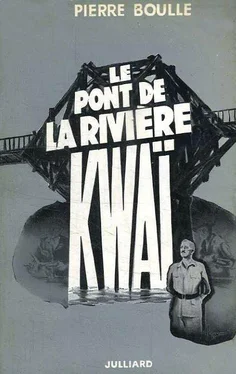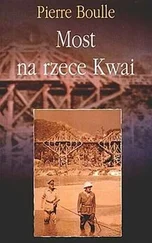“So we’re all agreed on this point, then, Colonel Saito? That means, all the work up to now has been useless. But it would have to be done all over again in any case, as there are serious faults in it.”
“Bad workmen,” snapped Saito, who was out for revenge. “Japanese soldiers would have built those two sections of line in less than a fortnight.”
“Japanese soldiers would certainly have done better, because they’re used to their officers commanding them. But I hope to show you the true worth of the British soldier quite soon, Colonel Saito. Incidentally, I ought to tell you that I’ve altered our men’s quota.”
“Altered it!” Saito screamed.
“I’ve increased it,” the Colonel calmly replied, “from one cubic yard to one and a half. It’s in the general interest, and I felt this step would meet with your approval.”
The Japanese officer was completely dumbfounded, and the Colonel took advantage of this to put forward another question.
“You must realize, Colonel Saito, that we’ve got our own methods and I hope to prove their value, provided we’re left free to apply them. We’re fully aware that the success of this sort of venture depends more or less entirely on basic organization. And while we’re on the subject, here are my suggestions, which I should like to submit for your approval.”
At this point the Colonel outlined the administrative plan on which he had worked for the last two days with the help of his staff. It was a fairly simple one, designed to cope with this particular situation, in which each separate department had a proper function. Colonel Nicholson was to be in sole charge, and personally responsible for everyone to the Japanese. Captain Reeves was entrusted with the plans for all the preliminary, theoretical work, at the same time acting as technical adviser on the practical side. Major Hughes, who was good at handling men, was to be a sort of chief foreman, responsible for directing the labor. Immediately under him were the platoon officers, who were to supervise the individual working parties. An administrative department had also been formed, at the head of which the Colonel had appointed his best corporal clerk. His main duties were to be liaison, transmission of orders, control of the quota, distribution and maintenance of tools, etc.
“This department is absolutely essential,” the Colonel explained. “I suggest, Colonel Saito, that you hold an inspection of the tools which were issued only a month ago. They’re in a really scandalous state…”
“I strongly recommend that this scheme be accepted,” said Colonel Nicholson, as he looked up again after describing in detail the machinery for the new organization and explaining the reasons which had led to its formation. “I am, of course, at your disposal to enlighten you further on any point whenever you wish, and I assure you that any suggestion will be carefully studied. Do you agree in principle with these proposals?”
Saito was certainly in need of further explanation, but the Colonel had such a commanding presence as he pronounced these words that he could not refrain from making yet another gesture of assent. With a mere nod he agreed to the whole of this scheme, which deprived the Japanese of all initiative and rendered his own position more or less insignificant. He was prepared to put up with almost any humiliation. He was resigned to any sacrifice in order to see the piles ready to take the weight of this bridge, on which his very life depended. Reluctantly, in spite of himself, he felt confidence in the strange Western preparations for getting the work under way.
Encouraged by his initial success, Colonel Nicholson went on:
“There’s another important point, Colonel Saito—the time factor. You realize, of course, how much extra work will be needed for the longer stretch of line. Then the new camp that will have to be built ”
“Why a new camp?” Saito protested. “Surely the prisoners can march a couple of miles to their work!”
“My colleagues have studied the question from both angles,” Colonel Nicholson patiently replied. “They have come to the conclusion…”
The calculations worked out by Reeves and Hughes showed quite clearly that the total number of hours spent on a daily march was far greater than the time needed to build a new camp. Once again Saito found himself out of his depth when confronted with conjectures based on wise Western forethought. The Colonel continued:
“Besides, we’ve already wasted over a month, as a result of an unfortunate disagreement for which we’re not to blame. To get the bridge finished in the time laid down —and I promise you it will be, if you accept my new suggestion—we’ll have to start felling the trees and preparing the supports at once, while other teams simultaneously work on the railway line, and others still on the new camp. According to Major Hughes’s calculations—and he’s had a great deal of labor experience—we shan’t have enough men to get all this work done in time.”
Colonel Nicholson paused for a moment in the tense, expectant silence, then continued in a resolute tone:
“This is what I suggest, Colonel Saito. For the moment we’ll put most of the British soldiers to work on the bridge. Only a small number will be available for the railway Line, so I shall ask you to lend us your Japanese soldiers to reinforce this group, so as to get the first stretch finished as quickly as possible, I think it should also be up to your men to build the new camp; they’re more used to handling bamboo than mine are.”
It was at this particular moment that Clipton was swept away by one of his regular floods of affection. Until then he had felt several times like strangling the C.O. Now he could not stop looking at those blue eyes of his which, after glancing at the Japanese colonel, candidly interrogated every other member of the conference in turn, as though to demand an assurance that his last request was a fair one. He felt a momentary suspicion that there might be some cunning Machiavellian process at work behind that apparently artless exterior. Anxiously, earnestly, desperately, he examined each feature of that serene countenance in the wild hope of discovering some sign of treacherous, underhand scheming. After a moment he gave up and looked away.
It’s out of the question, he decided. Every word he said is meant sincerely. He really has tried to work out the best means of accelerating the work.
He looked up again to watch Saito’s face and derived much comfort from the sight. The Jap’s features were the features of a victim on the rack, who had reached the limit of human endurance. He was tortured by shame and anger, yet caught in the trap of this relentlessly logical argument. He had little or no chance of getting out of it. Once again he was forced to yield, after hesitating between protest and submission. His only hope now was to regain a little of his authority while the work was actually in progress. He was not yet aware of the abject state to which he was to be reduced by the wisdom of the West. Clipton knew that the Jap could never again retrieve the position he had now abandoned.
Saito capitulated in his usual manner. He suddenly barked out a few orders to his henchmen, speaking in Japanese. Since the Colonel’s speech had been so rapid that only he had understood it, he was able to transmit the proposals as his own idea and transform them into words of command. When he had finished, Colonel Nicholson brought up one last point, a detail, but a tricky one, to which he had had to give his full attention.
“We’ve still got to fix the quota for your men working on the line, Colonel Saito. At first I thought of putting it at one cubic yard so as not to overtire them, but don’t you think it would be best if we made it the same as the British soldiers’? That would also create a healthy competitive spirit.
Читать дальше











